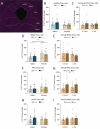This is a preprint.
Behavioral and neural correlates of diverse conditioned fear responses in male and female rats
- PMID: 39229164
- PMCID: PMC11370446
- DOI: 10.1101/2024.08.20.608817
Behavioral and neural correlates of diverse conditioned fear responses in male and female rats
Update in
-
Behavioral and neural correlates of diverse conditioned fear responses in male and female rats.Neurobiol Stress. 2024 Sep 21;33:100675. doi: 10.1016/j.ynstr.2024.100675. eCollection 2024 Nov. Neurobiol Stress. 2024. PMID: 39391589 Free PMC article.
Abstract
Pavlovian fear conditioning is a widely used tool that models associative learning in rodents. For decades the field has used predominantly male rodents and focused on a sole conditioned fear response: freezing. However, recent work from our lab and others has identified darting as a female-biased conditioned response, characterized by an escape-like movement across a fear conditioning chamber. It is also accompanied by a behavioral phenotype: Darters reliably show decreased freezing compared to Non-darters and males and reach higher velocities in response to the foot shock ("shock response"). However, the relationship between shock response and conditioned darting is not known. This study investigated if this link is due to differences in general processing of aversive stimuli between Darters, Non-darters and males. Across a variety of modalities, including corticosterone measures, the acoustic startle test, and sensitivity to thermal pain, Darters were found not to be more reactive or sensitive to aversive stimuli, and, in some cases, they appear less reactive to Non-darters and males. Analyses of cFos activity in regions involved in pain and fear processing following fear conditioning identified discrete patterns of expression among Darters, Non-darters, and males exposed to low and high intensity foot shocks. The results from these studies further our understanding of the differences between Darters, Non-darters and males and highlight the importance of studying individual differences in fear conditioning as indicators of fear state.
Conflict of interest statement
Declaration of competing interest: The authors declare that they have no known competing financial interests or personal relationships that could have appeared to influence the work reported in this paper.
Figures








References
-
- Benarroch E. E. (2012). Periaqueductal gray An interface for behavioral control. - PubMed
Publication types
Grants and funding
LinkOut - more resources
Full Text Sources
Miscellaneous
